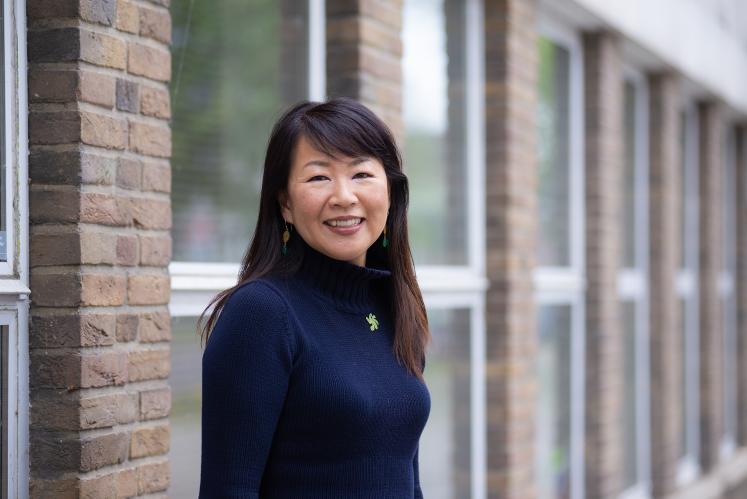Today, 24 October, is UN Day, marking the 79th anniversary of the founding UN Charter coming into force in 1945. To commemorate this special occasion, UNU-MERIT collaborated with the Maastricht Diplomat - an initiative of the United Nations Student Association in Maastricht - on a podcast featuring our researcher Dr. Sanae Okamoto, as she prepares to present her latest findings on how climate change is affecting mental health at the 2024 UN Climate Change Conference (COP29) next month.
In this podcast, Okamoto touches on the following topics, among others:
- how misinformation around the climate crisis is affecting global mental health
- the use of AI to collect public social media data on a population's anxiety levels regarding an extreme climate event (e.g. a flood), and how that can lead to faster and more effective support from authorities
- how the public and private sectors are collaborating to establish improved mental health interventions
- the importance of bringing health to the forefront of COP discussions
- how climate education is becoming increasingly embedded in school curriculums, and the positive impact of this
Listen to the podcast here, or read the abbreviated transcript below (edited in parts for clarity).
Welcome to the Maastricht Diplomat's Portrait Series, celebrating inspiring individuals making a positive impact.
Sarah Hourquet: Welcome, everyone, to our first podcast episode of the year and a new interview series where we speak with interesting and successful people from all walks of life—academia, business, and more. I’m Sarah Hourquet, Editor-in-Chief of the Maastricht Diplomat, and joining me behind the mic is Raquel Ureña, our Co-Head of Audiovisual.
SH: In today's episode, in honour of UN Day 2024, we're joined by Dr Sanae Okamoto, a behavioural science specialist turned private sector mentor and United Nations University researcher specialising in the role of mental health in the climate crisis and how different factors such as pollution can play a role.
You are a decorated behavioural researcher of both humans and apes. You now teach and research at UNU-MERIT. You've published multiple articles and are part of so many projects in areas such as nature-positive engineering or the UNU Climate Resilience Initiative. Can you tell us a bit more about yourself?
Sanae Okamoto: Thank you, Sarah. I'm Dr. Sanae Okamoto, currently a Senior Researcher at UNU-MERIT. My background is in psychology and behavioural science, and my current projects focus on climate resilience, the circular economy, and mental health.
SH: So, let's dive into climate change and mental health, your area of research. What do you think poses the greatest mental health risk related to the climate crisis?
SO: I believe the biggest risk lies in climate-related misinformation and the sensationalism often seen in the media. This kind of reporting can fuel anxiety because climate change is an immense, complex issue—rooted in human actions—yet the uncertainty surrounding its timeline and impact only heightens people’s fears. It’s this sense of unpredictability, coupled with a constant flood of information, that creates widespread anxiety and paralysis.
SH: Okay, can you explain the importance of keeping mental health in the general discussion of climate crisis, because this is not really a topic that we hear about every day? And why is it so important for individuals?
SO: Mental health, and health in general, is a fundamental aspect of the climate crisis. Climate risks are health risks because health embodies the human experience of climate change.
Each year, more than five million people worldwide die of causes related to air pollution from fossil fuel use and also heat related illness and around 189 million people are exposed to extreme weather events. Even without factoring in climate change, mental health services are severely under-resourced, with only 13 care workers available per 100,000 people, and just 2% of health budgets allocated to mental health issues.
So the capacity is not there, and the finance is also not there, and national governments are still not providing enough budget for these services.
Also, climate change may make things worse for the vulnerable populations who don’t have proper access to health support, mental health support, and with climate events like floods, have even less access to such support.
Then there are also cultural barriers, like stigmas in certain regions, which also prevent open discussions on mental health. For example, I am from Japan, where people refrain from talking about their mental health publicly and are embarrassed to ask for support. So that case, these kind of stigmas and cultural norms should also be addressed to make sure everyone has a space to express their feelings.
SH: Have you noticed any shifts in the perception or prioritisation of mental health, especially in relation to the climate crisis, over recent years?
SO: Absolutely. My interest in mental health has always been central to my research, but COVID-19 heightened the global awareness. The pandemic forced many of us into introspection, triggering anxieties tied to uncertainty—a theme familiar in climate discussions. In recent years, especially among younger generations, there’s been a noticeable rise in mental health awareness campaigns, highlighting the growing urgency of this issue.
SH: And if you were to outline the most critical aspect of climate resilience, what would it be?
SO: I would say “health.” Health is the foundation of everything—planetary, human, and animal welfare. Without physical and mental well-being, it’s impossible to face the daily challenges posed by the climate crisis. Health, in all its forms, is interconnected with the planet's overall well-being.
SH: How would you want the general public to cooperate in the climate crisis and what are the most effective actions?
SO: Public engagement is vital in both climate mitigation and adaptation. For mitigation, it’s about making sustainable lifestyle choices—using public transport, recycling, and reducing waste. For adaptation, it involves raising awareness, particularly around mental health. Unlike physical injuries, mental health issues are invisible, making it critical to create safe spaces where people can express their concerns and share experiences.
SH: You also work with AI. How can artificial intelligence support efforts related to climate change and mental health?
SO: AI and machine learning are powerful tools for predicting mental health trends in response to climate events. For instance, we can use sentiment analysis from social media platforms to detect spikes in anxiety or fear during extreme weather events. This data can then inform public authorities for timely interventions. Effective public-private partnerships (PPP), as outlined in the UN’s Sustainable Development Goals, are crucial to harnessing AI’s potential in this context.
SH: Thank you. How has your work been received within international discussions, such as the upcoming COP29?
SO: This will be my third COP, and each conference has distinct goals. In Sharm el-Sheikh, Egypt, two years ago, we successfully established the Loss and Damage Fund. Last year’s COP in Dubai marked a significant turning point, with health finally taking centre stage in climate discussions—something long overdue. It was the first time health ministers were actively involved in COP negotiations.
SH: It’s encouraging to see health gaining recognition. What are your hopes for COP29?
SO: My primary hope is to see transparent, accountable climate financing, particularly in relation to the Loss and Damage Fund. Negotiating how funds are allocated, who contributes, and ensuring effective use is always complex. But it's crucial for progress.
SH: How do you manage your demanding workload, balancing research, teaching, and advocacy?
SO: It’s a good question. Time management is key, though I’ll admit I’m still working on it! I’m fortunate to have supportive colleagues, and I try to view my research as a social activity, enjoying the collaborative aspect as much as possible.
SH: Thank you, Dr. Okamoto, for sharing your insights. It's been a pleasure to have you as our first guest in this new series, and we look forward to more inspiring conversations on topics that matter.
SO: Thank you for having me.



